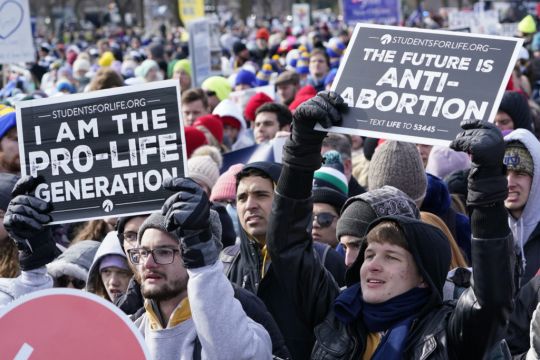Thousands of anti-abortion protesters have rallied in the US capital Friday with a growing sense of optimism that their goal was finally in reach: a sweeping rollback of abortion rights.
The March for Life, for decades an annual protest against abortion, was held as the Supreme Court has indicated it will allow states to impose tighter restrictions on abortion with a ruling in the coming months — and possibly overturn the landmark 1973 Roe v Wade ruling that affirmed the constitutional right to an abortion.
“It doesn’t feel real. There’s so much hope and vibrancy and happiness and joy at this thing,” said Jordan Moorman of Cincinnati. “I really do believe that we’re in a post-Roe generation.”

The Washington DC rally, held on the anniversary of the Roe decision, is taking place amid a Covid-19 surge that limited turnout at the National Mall.
Some abortion opponents posted on the event’s Facebook page that they will not attend because of vaccine mandates for people going to restaurants and other places in the District of Columbia.
Still, the rally drew a crowd of thousands on a sunny but frigid day, with a heavy contingent of young people and students bussed in by schools and church groups. The mood was overwhelmingly optimistic, with many treating the end of Roe v Wade as an inevitability.
“Hopefully this will be the last March for Life,” said Father Andrew Rudmann, a Catholic priest from New Orleans, who was attending his 11th event.
Fr Rudmann said previous marches may have had larger crowds but he does not recall this level of optimism. He said the crowds grew “gigantic” under former president Donald Trump and the movement’s enthusiasm grew with each Trump Supreme Court appointee.
He proudly pointed out that his home Archdiocese of New Orleans includes the Catholic high school that educated Mr Trump’s last appointee, Supreme Court Justice Amy Comey Barrett.
“Sometimes I would come to the March and it would be great to be united with people who share my beliefs, but there would also be this heaviness,” he said. “This time the whole language and vibe is different.”

Abortion rights groups worry that at least 26 states are in line to further limit abortion access if Roe is weakened or overturned. In December, the court indicated in a major case that it would uphold a Mississippi ban on abortions after 15 weeks of pregnancy, and allow states to ban abortion even earlier. The Mississippi case directly challenges Roe.
Courts have also dealt Texas abortion providers a string of defeats over efforts to block a law that since September has banned abortions once cardiac activity is detected, which is usually around six weeks and before some women know they are pregnant.
Another loss for Texas clinics came on Thursday, when the Supreme Court refused to speed up the ongoing challenge over the law, which providers say is now likely to stay in effect for the foreseeable future.







